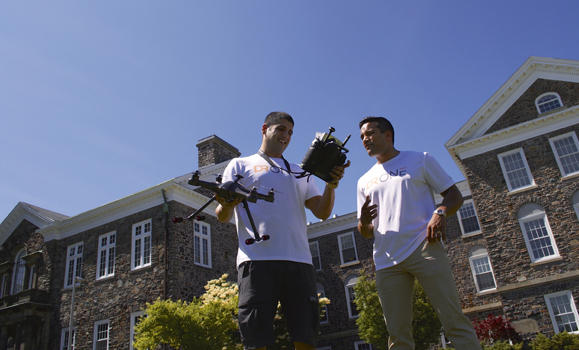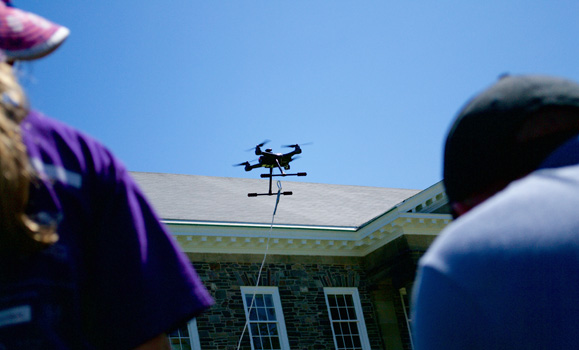There’s a buzz in the air at camps this summer thanks to one drone firm’s generosity.
, a new Halifax-based startup that sells and repairs drones, donated a small propellor-driven model worth $1,800 to the popular science education camp in mid-July.
Drones ‚ÄĒ also known as unmanned aerial vehicles (UAV) ‚ÄĒ originally entered into use as part of military operations but are increasingly being used for civilian purposes. Farmers can use them to keep an eye on their fields. Filmmakers can equip them with high-definition cameras to snag that birds-eye-view shot from above. Police forces can deploy them to help carry out an operation and firefighters to survey a scene from above.
SuperNOVA organizers hope to drum up excitement about the potential uses of UAVs in the computer science portion of its camps, which are held weekly throughout July and August. The not-for-profit, hosted by Dal, aims to provide youth in Atlantic Canada with fun and educational experiences in STEM topics (science, technology, engineering, mathematics) and hosts workshops and events through the year in addition to its popular summer camps.
Aerial adventures
Jarman Ley, the computer science coordinator at SuperNOVA, says working with the drone ‚ÄĒ a recreational model intended for snapping photos and video ‚ÄĒ will show children that computer programming can be about much more than making stuff happen on a screen.
Kids in the camp sessions will be tasked with programming the drone to successfully carry out different flight missions. That means helping to direct the aircraft on its journey from take off to touchdown, while avoiding obstacles along the way.
‚ÄúIt‚Äôll show them that computer science is not just about the computer, but about how computers and technology can interact and affect real-world objects,‚ÄĚ says Ley, a recent Dal Mechanical Engineering grad who also works at Dr. Drone.
While only counsellors will get to take the controls and operate the aircraft, working on the flight plans and seeing those put into action should help generate interest and enthusiasm in the burgeoning field among camp participants, says Ley.

Dr. Drone's Eddie Habib, left, and Kiran Persaud inspect a Walkera Scout X4 drone before a flight demonstration in the Studley Quad.
That certainly seemed to be the case in mid-July, when about 50 camp participants, their parents and SuperNOVA instructors converged on the lawn outside the Killam Library for the drone handover and a flight demonstration by a Dr. Drone employee.
Kids looked on as the drone’s propellers whirred to life and the aircraft soared into the air for a short journey near the University Club and the Macdonald Building on Studley campus.
Eager to learn
Following touchdown, plenty of curious campers stuck around to ask Ley questions.
‚ÄúHow does it work?‚ÄĚ inquired one. ‚ÄúHow high can it go?‚ÄĚ asked another. ‚ÄúCould you put skates on it?‚ÄĚ wondered a third, particularly creative, camper.
Kiran Persaud, a Dal Industrial Engineering student who is director of operations and a co-founder at Dr. Drone, says his startup donated the aircraft to SuperNOVA as part of an effort to get more young people interested in what he sees as a transformative technology.
Persaud's own interest in UAVs began a few years back when he was featured in a promotional video that was shot in part using a drone. He then went on to found Dr. Drone with a few fellow enthusiasts about a year ago.
Back at the flight demonstration, the last die-hard kids wrap up their questions to Ley and run over to take a closer look at the drone.
‚ÄúI wouldn‚Äôt be surprised if one of these kids says ‚ÄėOne time when I was five I saw a drone and now I‚Äôm a head leader, a pilot, or a researcher,‚Äô‚ÄĚ says Ley. ‚ÄúIt‚Äôs good to be a part of that story.‚ÄĚ


